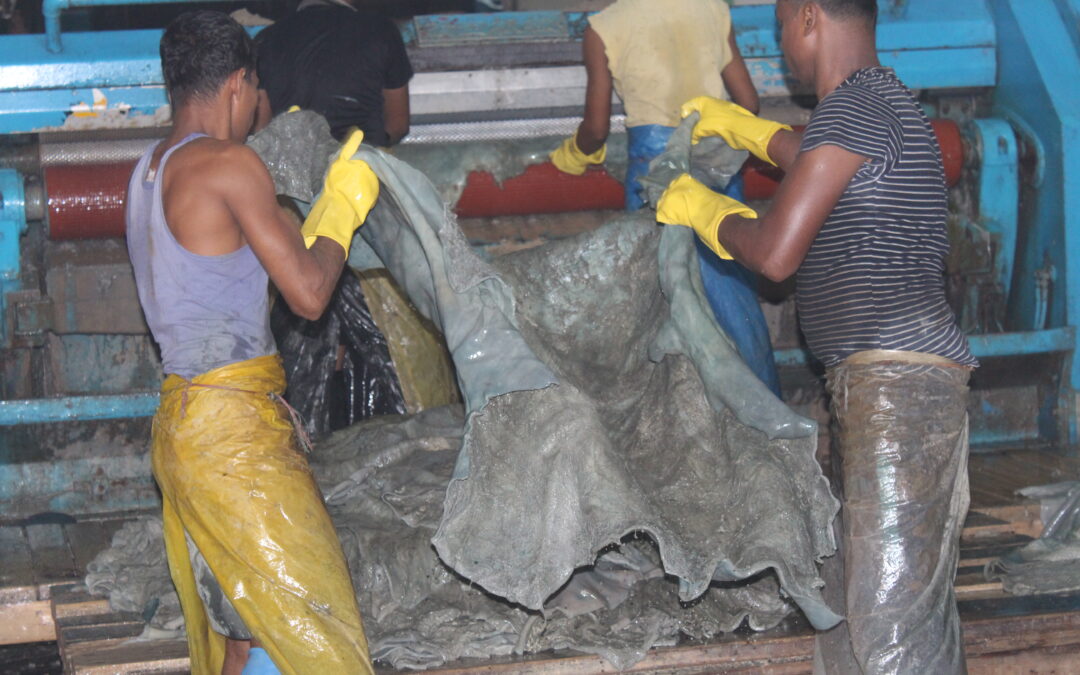
Apr 19, 2023
A survey of tannery workers living in Hemayetpur, Bangladesh, is illustrating how the impact of industrial pollution, harsh working conditions and low wages is leaving workers, their families and their communities increasingly vulnerable to ever-increasing climate-related shocks in the country.
“When combined with the health consequences of environmental degradation and the climate crisis, the compounding impacts on workers, their families and their communities are devastating,” says Sonia Mistry, Solidarity Center climate and labor justice global lead.
More than 200 tannery workers were surveyed for a study conducted with Solidarity Center support by Jagannath University Associate Professor Mostafiz Ahmed. Survey findings include:
- More than half of those surveyed say their employment prospects have been negatively affected by environmental impacts. Of this number, nearly 70 percent report consequences from environmentally related illnesses, including wage cuts.
- More than 80 percent say their wages are too low to meet their family’s needs and more than 90 percent are working without a contract. Precarious employment exacerbates vulnerabilities to ongoing climate shocks, reducing resilience for entire communities.
- The majority (75 percent) of participants have suffered work-related broken bones, and a similar number experience respiratory problems—including asthma.
Leather production is one of Bangladesh’s oldest industries, and the country’s leather exports satisfy one-tenth of world demand. For decades, tanneries in the main industrial site in Dhaka dumped 22,000 cubic meters of toxic waste daily into the Buriganga River, wiping out aquatic life and polluting ground water needed for drinking.
Amid increasing international pressure about toxic tannery-related environmental and working conditions, the government in 2017 ordered approximately 25,000 tannery workers and their families to move from Hazaribagh, a Dhaka neighborhood and one of the most polluted places on Earth, to the newly built Tannery Industrial Estate in Hemayetpur. Although the new site provides a central effluent treatment plant, all factory sludge and effluents are still not being treated and environmental threats remain.
“Engaging with workers and their unions through collective bargaining and policy development is essential to improving working conditions and developing climate and environmental solutions, both of which are necessary to build resilience for workers and their communities,” says Mistry.
In the Bangladesh tannery sector, the Solidarity Center partners with the Tannery Workers Union (TWU), which for almost 60 years has worked to protect the rights and interests of the workers in the sector.
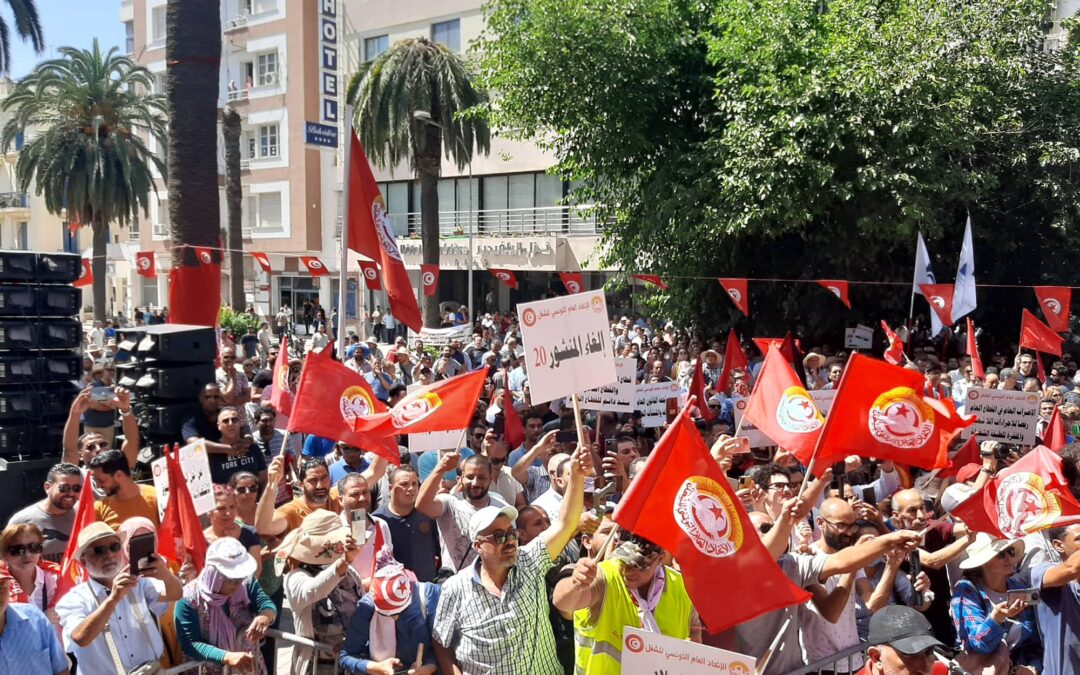
Apr 6, 2023
For the second time this year a leader of the Tunisian General Labor Union (UGTT) was arrested, this time for suspicion of insulting a public official at a protest outside the country’s Ministry of Culture building. The arrest of the UGTT’s secretary for culture, Abdel Nasser Ben Amara last month—who has since been acquitted in court—is having a chilling effect on union work in the country and their efforts to represent workers’ interests, say unions.
The UGTT with civil society organizations last year convened a national initiative for the restoration of democracy after more than 90 percent of the country’s voters stayed away from Tunisia’s widely criticized December 2022 parliamentary elections. Workers last month took part in a series of rallies across the country to protest the government’s increased aggression against the union and its members, including arrest of general secretary of the highway workers’ union, Anis Kaabi. On Saturday more than 3,000 people joined a UGTT-organized rally calling for the government to accept “dialogue.”
Anis Kaabi’s January arrest after leading a strike by toll booth workers was denounced by a coalition of 66 human rights groups and Tunisian political parties as a “desperate attempt to criminalize union work.” European Trade Union Confederation (ETUC) General Secretary Esther Lynch was ordered in February to leave the country after having addressed UGTT rally goers and called on Tunisia’s government to negotiate with workers to stabilize the economy.
Union members who legally exercise their rights in Tunisia, such as the freedom to strike, have been increasingly targeted, according to data from the UGTT, which found that the percentage of cases filed against union members rose in 2022, with a quarter of them directed against women. The government through February had filed more than 60 cases against union members for exercising their internationally recognized labor rights, according to UGTT, which says the numbers indicate a stepped-up effort to diminish the union’s power and turn public opinion against it.
The UGTT, which represents more than 1 million members, in 2015 shared a Nobel Peace Prize with three other civil society groups for promoting national dialogue in Tunisia.
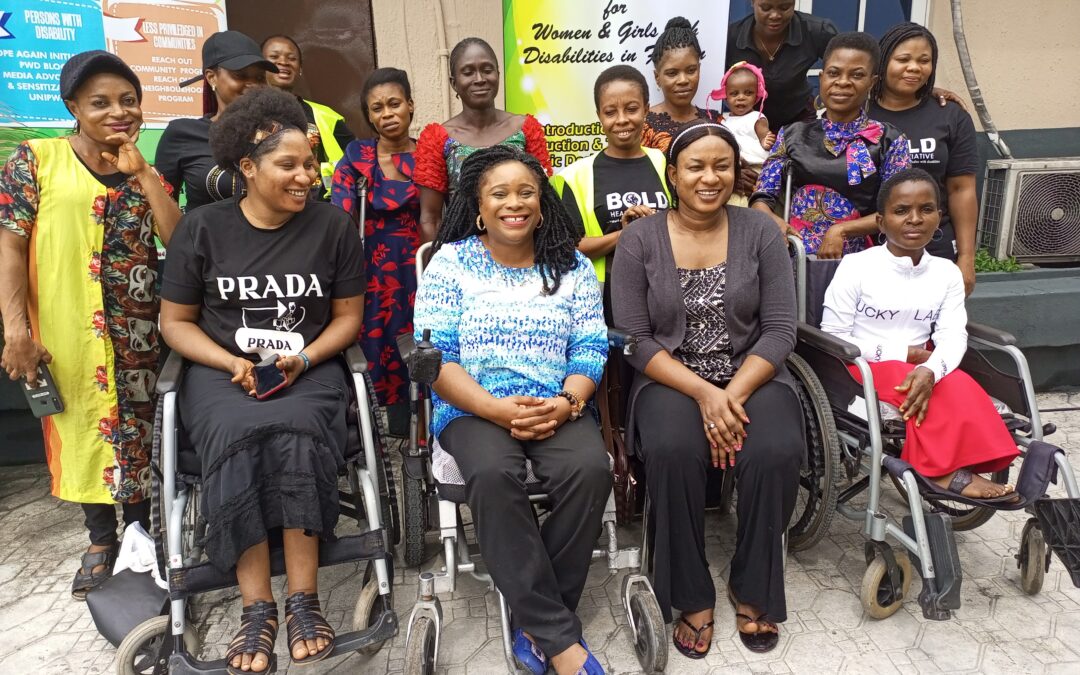
Mar 27, 2023
A survey of more than 600 workers with disabilities in Nigeria’s formal and informal sectors, conducted by the Trade Union Congress of Nigeria (TUC) Women Commission and the Solidarity Center in collaboration with Nigerian unions and disability rights organizations, finds that most workers with disabilities cannot access decent work as defined by the UN International Labor Organization (ILO).
“It provides evidence for what we have been saying for so long [and is] a powerful tool for advocacy,” says Nigeria disability advocate and FAECARE Foundation Executive Director Ndifreke (Freky) Andrew-Essien.”
“Securing Equal Access to Decent Work in Nigeria: A Report by Workers with Disabilities,” reports quantitative data collected from 322 men and 338 women workers with disabilities across seven geopolitical zones and the Federal Capital Territory in Nigeria, supported by qualitative data collected from union members. The study—for its sample size and breadth, as well as for the collaboration between trade unions and disability rights organizations—is the first of its kind. An estimated 1 billion people experience disability worldwide, the majority in developing countries. According to the World Health Organization’s 2011 World Report on Disability, between 25 million and 27 million people experience a disability in Nigeria, the majority of whom live below the poverty line. Indeed, disability, and low socioeconomic status interact to keep people in poverty.
The survey found that, regardless of legislation aimed at addressing diversity in the Nigerian workplace, disabled workers do not experience the same access to employment opportunities as their counterparts without disabilities and often face physical, social, economic and/or environmental barriers to participation.
Findings and Recommendations
Most of the 660 workers surveyed are self-employed and in the informal sector. Almost half of respondents earn less than Nigeria’s minimum wage and say their work environment is not accommodating to their disability. Most (62 percent) cite transportation as the most significant obstacle to accessing work, followed by a lack of disability-friendly facilities (33 percent) and poor communication with or unsupportive co-workers (19 percent). Nearly a quarter of disabled workers say they work more than eight hours without overtime pay. A similar number had experienced violence or harassment (GBVH) during the previous two years.
Researchers conclude that a variety of actions—by the Nigerian government, employers and unions—could build an inclusive working environment that respects, includes and accommodates disabled workers. This includes the revision of laws to outline reasonable accommodations in employment and the creation of a disability tax fund to provide adequate social security benefits. In addition, unions, along with disabled workers, should work together to demand reasonable accommodations at work and greater accessibility.
The ILO defines decent work as work that is available to all equally, is productive and delivers a fair income and security in the workplace, provides equal access to social protections—such as pensions, and adequate and affordable healthcare—and affords workers freedom to participate equally in decisions affecting their work lives.
Download a summary booklet here.
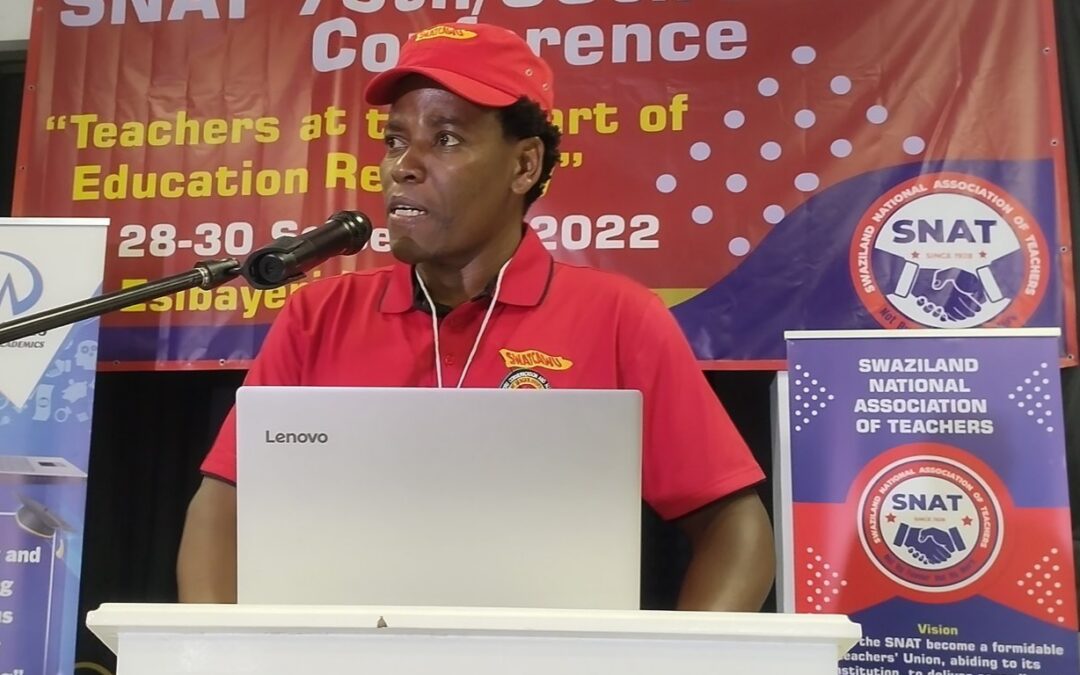
Feb 2, 2023
Fearing for his life and liberty, pro-democracy activist and Swaziland Transport, Communication and Allied Workers Union (SWATCAWU) General Secretary Sticks Nkambule remains trapped in exile while his union campaigns to bring him home safely.
The murder last month of human and worker rights lawyer and pro-democracy activist Thulani Maseko—whom Nkambule describes as “friend, colleague, personal attorney and man of peace”—demonstrates that Eswatini is unsafe for rights defenders, says Nkambule.
“We are being visited by killing squads,” he says.
While he was out of the country, on December 28, 2022, Nkambule’s home was raided and his family harassed by heavily armed members of the police and military. In January—after police published Nkambule’s name as a wanted person for alleged criminal conduct associated with a SWATCAWU December 13 –14 job “stay away” announcement—Nkambule began receiving reports of dozens of armed state and military members searching for him and other SWATCAWU leaders in multiple locations.
Under such circumstances, Nkambule says his return is impossible and, even in his new location, he cannot live freely for fear of mercenaries.
“The regime is clear to say that certain figures and faces need to go,” says Nkambule, referring to a “list of terrorists” publicly cited by the leader of a South African company that has a contract to train Eswatini security personnel, per news reports.
Eswatini state harassment of unions and other rights defenders is a decades-long pattern which, reports Nkambule, last year included stepped-up police and military harassment of SWATCAWU leadership, and surveillance by unknown persons in unmarked cars. Growing state repression and fear have led many rights defenders to flee, he says—including Swaziland National Association of Teachers (SNAT) President Mbongwa Dlamini, who left the country after state security forces fired live ammunition at his home last year.
Harassment of union leaders ramped up after SWATCAWU began announcing job actions, reports the International Trade Union Confederation (ITUC). The union began a series of “stay aways” last year, says Nkambule, to sidestep the state’s brutal repression of peaceful protests, which in 2021 included police and military members beating rally goers and firing live ammunition into crowds during popular uprisings against the king’s government.
“[The October stay away] worked,” says Nkambule. “When protestors stay in their homes, they don’t get shot.”
However, the threat of a series of transport worker “stay aways”—which brings the economy to a standstill because workers cannot travel to their jobs—presents an unwelcome, and escalating, challenge to the state and employers.
“And that is why I have been singled out,” says Nkambule.
SWATCAWU has been embroiled for almost three years in a lawful and peaceful effort to encourage the state to improve transport workers’ wages and conditions—including a $233 monthly minimum wage, better access to social security and health care, repair of dilapidated roads and an end to police harassment—and to release from prison pro-democracy Eswatini Parliament Members Mduduzi Bacede Mabuza and Mthandeni Dube.
Meanwhile, Africa’s last absolute monarch, King Mswati III, controls all three branches of government, chooses the prime minister, can dissolve Parliament and appoints judges. Under his control, Eswatini has conducted a two-decades-long anti-union and anti-democracy campaign with impunity, reports the ITUC.
Human Rights Watch last month called on the South African government to investigate allegations that South African mercenaries and private military personnel who are allegedly operating in Eswatini are targeting pro-democracy activists. UN and African Union experts condemned Maseko’s murder and demanded an impartial investigation into his death, reiterating UN High Commissioner for Human Rights Volker Türk’s call for the authorities to ensure the safety of all human rights defenders, civil society actors and lawyers in Eswatini.
In the context of shrinking civic space and a global crackdown on human and worker rights, the Solidarity Center continues to support and partner with pro-democracy union activists across the globe, and has long supported beleaguered unions in Eswatini.
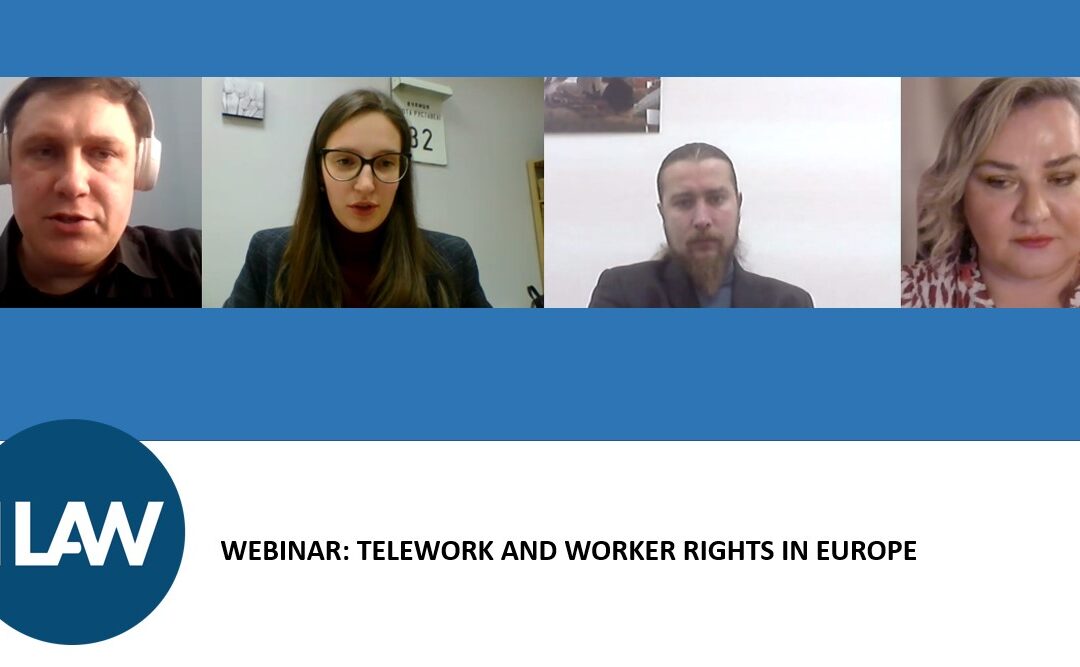
Jan 25, 2023
Only a worker rights-based approach can ensure that Europe’s growing numbers of teleworkers can fully exercise their fundamental labor rights—including to decent work, which includes safe working conditions—said International Lawyers Assisting Workers Network (ILAW) members Mihail Cebotari, Inna Kudinska, George Sandul and ILAW Europe and Central Asia Regional Coordinator Tamar Gabisonia during the launch of three new ILAW telework reports last week.
The webinar, centered on three new ILAW reports, surveyed the regulatory environment impacting teleworkers in Moldova, Poland and Ukraine. Poorly regulated telework tends to shifts financial and labor rights risks onto workers, who can experience longer work hours and burnout, unsafe working conditions, and constant employer surveillance. Isolation, meanwhile, can increase workers’ vulnerability to exploitation, discrimination, harassment and other abuse, including domestic violence. And, say unions, without proactive measures teleworkers will likely have fewer opportunities to participate in union activities and develop the sense of solidarity that builds and supports collective power.
“ILAW’s research findings allow all of us the opportunity to pursue better protection of teleworkers in our own countries and, through our participation in the network, to work on similar issues collectively,” says Georgian Trade Unions Confederation (GTUC) Deputy Chairman and founding ILAW Board member Raisa Liparteliani.
“Telework is not a separate form of employment relations and, therefore, all workers should enjoy all labor rights equally.”
Due to the COVID-19 pandemic—and, in Europe, the war in Ukraine—the share of the employed population working from home has increased exponentially. The International Labor Organization (ILO) estimates that approximately one in six jobs at the global level, and just over one in four jobs in advanced countries, could be done at home, including telework. By the end of 2022, an estimated 31 percent of all workers worldwide were to be fully remote or hybrid.
Report recommendations include:
- In Moldova, to bring national regulations on remote work into line with the European Union Framework Agreement on Telework, ensure that telework is voluntary and reversible, and that teleworkers be adequately protected by effectively enforced health and safety regulations.
- In Poland, to prevent the misuse of civil law contracts to deny teleworkers their rights under law, adopt clearer health and safety protections that balance the employer obligation to ensure worker safety with the privacy rights of workers, adopt provisions to address overtime work and ensure the right to disconnect, and institute mechanisms to tackle the systemic discrimination, violence and harassment often directed at remote workers.
- In Ukraine, to implement and enforce regulations in conformity with the best European and world legislative practices on telework and remote work—including fully incorporating the principle of voluntariness in remote and home-based work, adequately addressing discrimination and health and safety risks, and protecting workers’ right to privacy.
The new reports are part of an ongoing ILAW research series on telework and worker rights, which includes a regional report on telework in the Americas, along with ten national reports on Brazil, Colombia, Costa Rica, Ecuador, Mexico, Panama, Peru and Uruguay, released in 2022. Research on telework in Mauritius and South Africa is forthcoming this year. The ILAW Network’s Future of Labor Law Wiki also contains model legislative language and analysis of how to regulate telework.
The Solidarity Center’s ILAW Network is a forum for labor and employment law practitioners who grapple with the legal and practical issues that directly affect workers and their organizations.





